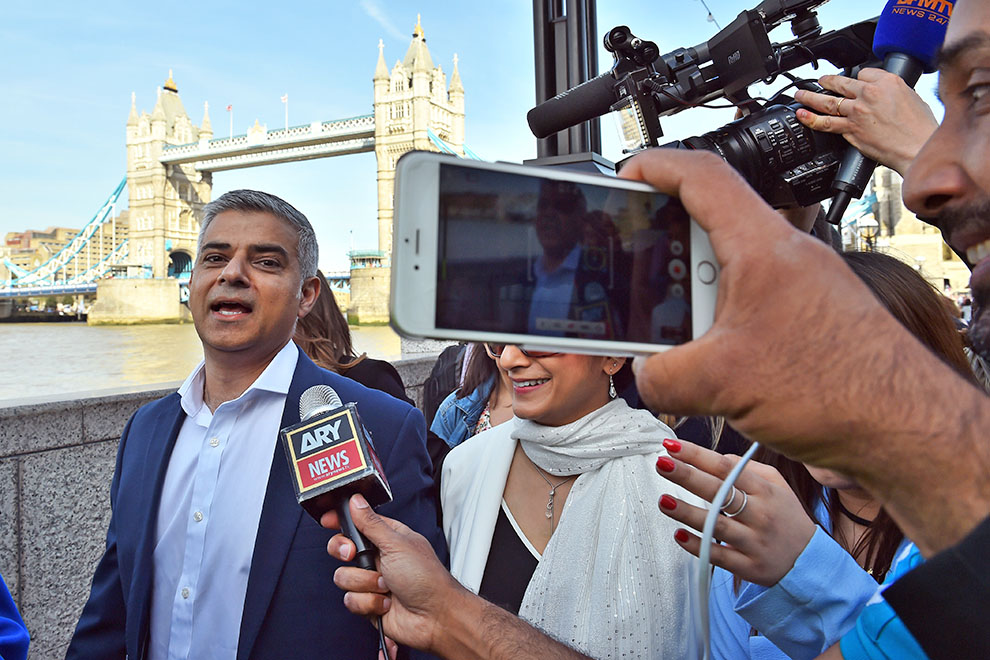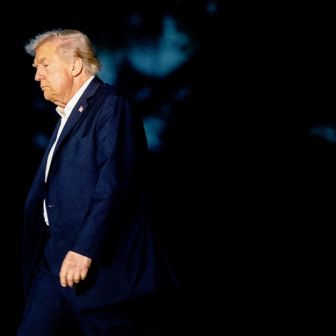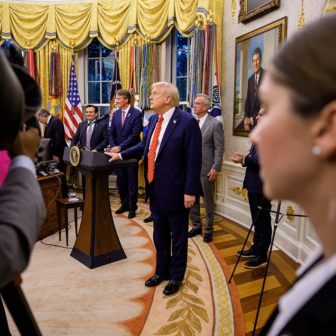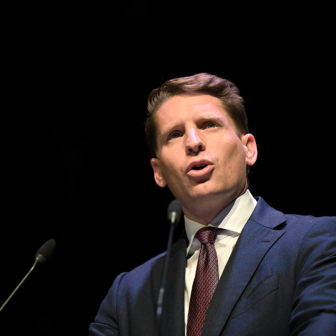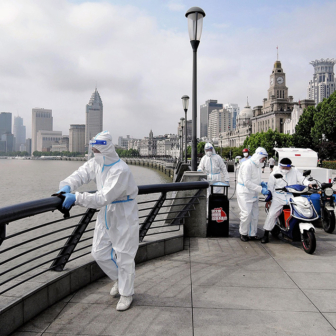The name Sadiq Khan may not yet light the neural circuits of the global political class, but as the new mayor of London, successor to Boris Johnson, that status is assured over the next four years. Ruth Davidson is a longer bet, but the leader of the Scottish Conservative Party could one day face Khan at prime minister’s question time. And if unforgiving politics makes dust of that prediction, the electoral triumphs of this lawyer son of a Pakistani immigrant bus driver and this ex-BBC lesbian kick-boxer– media pith at its best – at least serve notice that British public life can change for good.
It’s true that the weight classes of their successes in Britain’s 5 May electoral extravaganza are very different. The focused, energetic Khan, a Labour MP since 2005, received 1.3 million votes (56.8 per cent of the total after preferences) to defeat his lacklustre Conservative opponent, Zac Goldsmith, an independent-minded environmentalist whose campaign nonetheless descended into a low-rent, one-note toot of Khan’s meetings a decade ago alongside Islamist radicals.
Khan’s election is hailed as making him the first Muslim mayor of a Western capital (though the Labour politician Ahmed Aboutaleb, a Dutch Moroccan, has held the role in Rotterdam since 2009). In representing this major world city and carrying responsibility for its transport, police, housing and environment, both symbolism and delivery will be crucial. The Labour leadership could then beckon, with Boris – now the prime contender to succeed David Cameron as Conservative leader – as his lodestar.
It was also a dignified victory over that reductive, ill-judged Tory campaign, led since January by a Crosby–Textor–Fullbrook Partners associate. (Sir Lynton, knighted on 6 May, was not himself involved, though he is taking a close interest in the Brexit campaign.) Andrew Boff, a top London Conservative, derides descriptions of the campaign as “dog whistling” because that implies the Tories’ message was inaudible, and the diffident Zac’s was anything but.
The inquests have focused on Khan’s trajectory, the political significance of his Muslim-ness in a city of more than a million co-religionists, and the fact that he has received the biggest individual mandate in Britain’s political history (if prime ministers can be ruled out). There’s interest, too, in his acrobatic reversals of policy and alliance. He served as a minister under Gordon Brown and went on to nominate two London MPs, Ed Miliband in 2010 and Jeremy Corbyn in 2015, for the Labour leadership. Shapeshifting, unprincipled, slippery, a London machine man – or just a very good politician who embodies Labour’s future? All are touted by Labour insiders as much as journalists.
Relations between Khan and Corbyn – between Tooting’s hungry careerist and Islington’s superannuated leftist, across one of the capital’s many divides – are now fuelling intense speculation. The Labour leader was absent from the new mayor’s signing-in ceremony at Southwark cathedral on Friday (Ed Miliband was in the front row). A Corbyn adviser had marked Khan as “hostile” in a list grading the loyalties of Labour MPs. His distance from Corbyn during the campaign was resounding. The political heart of their gulf – and indeed of the differences cleaving the Labour Party since shortly after the election defeat of May 2015 – was expressed in Khan’s pointed remarks to supporters at a celebration near Tower Bridge: “You change society by winning elections… there is no such thing as heroic failure.”
Khan’s achievement, and certainly its global impact, may make Ruth Davidson’s seem parochial. A member of the Scottish parliament and leader of her party since 2011, she won the Edinburgh Central seat directly from the Scottish National Party, or SNP, in Scotland-wide elections. (Scotland’s parliament and Wales’s assembly mix first-past-the-post with party votes in “top-up” regional constituencies; Northern Ireland’s assembly uses the single transferable vote, or STV.) The leap from fifteen to thirty-one Conservative MSPs in the 129-seat parliament, seven ahead of a plunging Labour Party, was the party’s best showing since the body opened in 1999. It is now the official opposition to the still hegemonic SNP.
The combination of Labour’s fall – to its lowest vote share in Scotland since 1910 – and the Conservative emergence from years of entropy is a mini-earthquake by the country’s standards. (The magnitude of the SNP’s win in 2015 sets the seismograph very high.) To that extent, Davidson’s achievement is as notable as Khan’s, and at thirty-seven she has the time, smartness and sheer brio to match the forty-five-year-old.
Thursday’s vote, a year almost to the day since that 2015 election, also highlights the scale of the United Kingdom’s political transformation since the late 1990s.
Democracy may be in trouble in much of the world, but the British have been getting ever more chances to vote. That used to be a simple case of four- or five-yearly general elections interspersed with polls for urban and regional councils. In the last two decades, the opportunities have multiplied: the parliament in Scotland, assemblies in Wales and Northern Ireland, the mayoralty and assembly in London, city mayors and police-and-crime commissioners in parts of England, most of them voted for every four years. European parliament elections come around every five years and, in case people get bored, there are intermittent referendums (electoral reform was rejected in 2011, as was Scottish independence in 2014, and European Union membership will be voted on in 2016).
It was after 1997, in New Labour’s first term, that the program of “devolution” transferred powers from the United Kingdom’s centre in London to its constituent nations (including the metropolis itself). After a couple of electoral cycles, the various layers of governance learned to cohere, the media to distinguish between different legislative spaces, and many people to digest the previously unimaginable idea – which those in perhaps more mature democracies were long used to – of sovereignty shared, or at least blurred. A UK Tory government might coexist with a Labour mayor of London; or, indeed, a Sinn Féin representative, a former commander in the Irish Republican Army, might be deputy first minister of Northern Ireland.
So the former pan-UK electoral calendar has morphed into a multicoloured gear hub with six or seven speeds: encouraging for politicos, testing for journalists, paradise for political scientists, bewildering for citizens. Life in the United Kingdom might be taken to resemble an extended festival of participation.
If the main stars this time round were in London and Scotland, there was much else happening besides the Sadiq–Ruth show. It was a night of incumbents pressed but surviving and insurgents contained but gaining. Northern Ireland’s odd couple, Arlene Foster’s Democratic Unionist Party and Martin McGuinness’s Sinn Féin – the former endured attack by the IRA, the latter was a commander of the organisation – will continue in office. Foster’s authority is now established after an impressive campaign. The left-wing People Before Profit, already represented in Ireland’s Dáil, won two seats in urban nationalist heartlands. The veteran Derry journalist-activist Eamonn McCann sang “The Internationale” as his victory speech.
Wales’s well-oiled Labour machine again ensured victory for Carwyn Jones, maintaining the party’s uninterrupted period in office since the assembly there opened in 1999. But the loss of majority means it needs a coalition prop, and inevitably this is the nationalist Plaid Cymru, whose leader Leanne Wood toppled Labour heavyweight Leighton Andrews on her home patch of Rhondda. It was fitting that Wood – whose lilting accent and spirited putdown of Nigel Farage of the United Kingdom Independence Party, or UKIP, during a TV election joust in 2015 won English hearts – was Plaid’s only gain. UKIP, however, gained seven seats, confirming its growth in the country, while the Liberal Democrats lost four of their five, a prelude to the valiant Kirsty Williams’s departure as leader.
Nicola Sturgeon’s fate echoed Carwyn Jones’s: her SNP fell below a majority even as its vote share increased. It can afford to forgo a formal arrangement with the (also pro-independence) Greens, whose six seats overtake the Lib Dems’ five. After a dull campaign, the dramatic Tory advance has given Scottish politics much-needed vitality, and the effects may yet skewer Sturgeon’s plan – restated on 8 May in spiky fashion – to “change minds” in favour of a second independence referendum. Labour’s leader, Kezia Dugdale, is staying on at the helm of a clueless, directionless party. The Herald’s Paul Hutcheon, a long-term close observer of Scottish Labour, describes the decline of the party, for decades the British movement’s matrix, as an “unprecedented humiliation.”
England had its usual irregular parade of local contests. Councils elected in 2012, at a relatively strong moment for Ed Miliband’s Labour, faced judgement day; so did those mayors and police commissioners, the London assembly of twenty-five to which Sadiq Khan will be accountable, and the candidates in two Westminster by-elections in safe Labour seats. The council story was of stasis, overturning expectations of considerable Labour losses. Very few changed hands, and in a bad night for independents a Labour man won the mayoralty of multicultural Bristol. (Its 44.8 per cent turnout neared London’s 45.6 per cent, though the average across forty-one contests was 24 per cent – up from 15 per cent in 2012, but still dismal.)
A good night for Labour then, Scotland apart? Relative to some predictions, perhaps. A 31 per cent “projected national share,” or PNS, would be a life-saving floor, though it was 1985 when an opposition party last failed to gain council seats a year after a general election. “Only a limited amount of solace,” says Tony Travers, oracle on London and local governance, of the party’s performance, “Dr Corbyn’s elixir is snake oil,” writes the Observer’s Andrew Rawnsley in a righteously scathing overview. “The real disloyalists are those who refuse to face the facts and try to howl into silence people who are prepared to confront Labour with its plight.”
In its way, Labour’s down-but-not-out condition is good news for Tories, since they want Corbyn to stay in position as long as possible. As the referendum of 23 June approaches, though, their own civil war over the European Union has become so all-consuming that many take their opponents’ infirmity for granted. That may prove a mistake if governmental disarray – manifested in recent policy u-turns over steel closures, disability benefits, child migrants, junior doctors and school reforms – escalates into crisis. It also highlights the need for an opposition fit for purpose.
Corbyn was happy that Labour had “hung on.” Eight months after his takeover of the party leadership in September he is going nowhere (in both senses), though his long-term comrade and shadow chancellor John McDonnell – a professor of hard-left intrigue – is strongly rumoured to be manoeuvring. London’s Khan, Wales’s Jones, and Scotland’s Dugdale are among many who were not eager to have Jeremy’s “solidarity” in the election, at least if that meant a personal visit. Labour backbenchers agonise and seethe. The leader’s votaries exult and taunt. Labour is in a long, cold and undeclared civil war, with no guarantees except that a Corbyn-led party is a permanent void.
Is there a way out? Not soon, not before the EU referendum, and perhaps not even after, most agree. Two reliable critics of the Miliband–Corbyn era (as it should really be called) offer contrasting options. “Labour is two parties in denial,” says Dan Hodges in the Mail on Sunday. “Those who believe in winning need not just a new leader, but a new party.”
The digital Independent’s John Rentoul takes a longer view. He cites the suggestion of an ex-member of Tony Blair’s staff that the “party in exile” should mobilise “centrists who have left the Labour Party in despair” and use the same tools as did the Corbynites to win a leadership election. “By leaving, they appear to have made it easier for Corbyn to stay, but by threatening to rejoin when the time is right, they could take the party back.” But by then, will there be a party to take back?
Beyond the winners and losers of these elections, however, is a more fundamental point. All the offices won, England’s councils apart, are themselves less than twenty years old. When things improve in Britain, the activity of politics itself – slow, untidy, widely execrated – can often take a lot of the credit. Yet that credit is all too rarely given.
At the same time, progress also has unforeseen consequences and problematic anomalies. For example, UK citizens may have many more opportunities to exercise their vote, but have these outrun, or simply failed to serve, voters’ interests? The turnout figures, so often barely reported, are sobering in this respect. London’s 45.6 per cent, its highest ever, compared to the city’s 65 per cent in the general election of May 2015. Wales’s was 44 per cent (65 per cent in 2015), Northern Ireland’s 55 per cent (58 per cent in 2015), and Scotland’s 50 per cent (71 per cent in 2015). If those figures reflect a little better on the union than its constituent parts, they offer little encouragement either way. In eight elections for British members of the European parliament, turnout has never exceeded 40 per cent. The number of abstainers goes up and down, in a system where voting is voluntary, but is almost always too high for comfort.
It’s fitting then that basking in the country’s representative largesse isn’t exactly the native style. The British don’t give their consent easily, at least where politics is concerned. At the same time, they are loath to surrender what has once been acquired. Familiarity breeds a sense of ownership, of which even the usual frustrations of democratic politics – perhaps including, at a stretch, low turnout – can be seen as part. The British genius combines scepticism about change almost until the moment it happens, reluctant adjustment to its arrival, dedicated apathy in its presence, and strident resistance to any threat of its reversal.
Pity the politicians? Sometimes, yes. But if the very fact of these elections, from London to Scotland, tells a story of politics as improvement, it also shows how even the modernised architecture of democracy in the United Kingdom is already creaking. Over to you, Sadiq and Ruth. •
